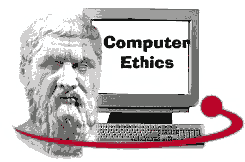Module 10 - Free Speech Issues

This module deals withspecificissue in the following categories:
a. Pornography
b. Hate speech
c. Extreme/Political views
d. Internet filters
The freedom if expression is one of the constitutionalrights guaranteed by the supreme law of the land. Hence, it is constantly advocated by those who do not want to be subjected to restrictions in their expressioin or articulation of their thoughts
Pornography / Cyberporn
- Advocates of pornography in the internet invoke their freedom of speech and expression. Pornography on the other hand threatens families everywhere, expecially children. Which should take precedence? At this point you might wish to refer back to the ethical standpoints presented previously. One standpoint is that the exercise of individual rights is not boundless. One should be responsible enough to realize that one's acts are subject to certain ethical norms that forbid abuse and misuse. The question of whether pornography is harmful is one main motivator for censorship of the Internet in regards to cyber-porn. In using the word 'harmful', it is understood that this is not necessarily physical damage but more of a mental harm to moral, religions, and ethical values. (Should the Internet Be CensoredBy: J-Sin) .
Hate Speech
Still the issue of free speech, is it all right to publish hate and libelous speeches against Islamic fundamentalist and disseminate these over the internet? Is it Ok to write hate speeches against a certain person and then post this on the internet? Is it moral to set up web sites exclusively for hate materials, racist or propaganda. Again these issues must be resolved and determined on the basis of whether they fall under computer ethics. Hate speeches will vary in genre such as: hate against Islamic fundamentalists, against homosexuality, against religous order and the like.
Extreme/Political Views
The proliferation of the site with violent contents such as beheading videos, bizarre and voyeuristic images posted freely on the net poses a great threat on society’s general welfare particularly the young. In a journal report by Russell, Sabin - San Francisco Chronicles, A significant number of visitors accessed freely the video of E. Armstrong’s beheading . What is frightening here is that nobody had any idea about the profiles of this individuals who accessed these violent site. Nobody knew if such sites were accessed by minors particularly children who, at their very young age would definitely have difficulties comprehending the horror of such reality. The report also added that such traumatic experience triggers a terrible reenactment of the worst moments of one’s life. It is an experience the lurks into the subconscious mind more especially in children who might have the natural tendency to perceive violent real-life incidents such beheading and human being in cold blood as normal and tolerable act. Again this are issue that still hanging in vague whether not freedom of expression such as these falls under the reign of computer ethics
Internet Filters
Some network employ the use of internet filters to block access to sites considered pornographic, for example. Some people consider this as censorship. Is it ethical for moralists to cause the blocking of access to sites that they consider as indecent and destructive?
The US passed in December 2000 the Children's Internet Protection Act(CIPA) that requires all schools and libraries receivinge-rate discounts or other federal assistance for Internet access to install filters on all computers used by adults as well as minors. The Clinton administration encouraged filtering as a response to the Supreme Court's 1997 decision striking down the Communications Decency Act (CDA), which is an attempt to block minors form Internet pronography, criminalized virtually all "indecent" or "patently offensive" communications online.



0 Comments:
Post a Comment
<< Home